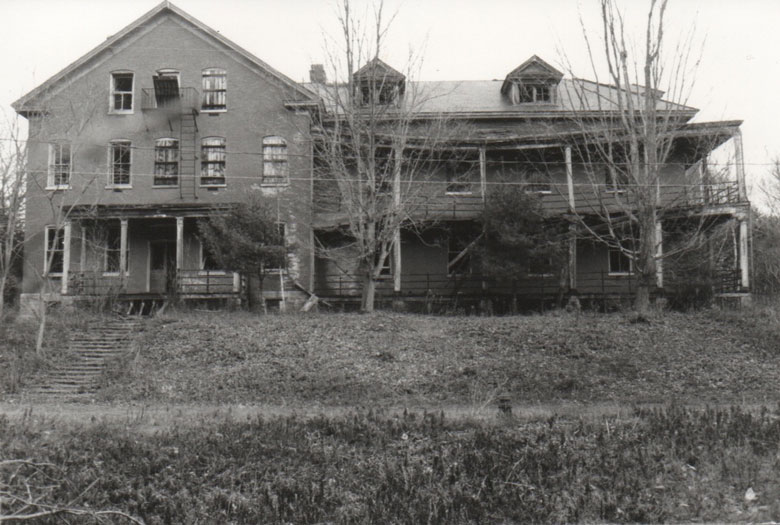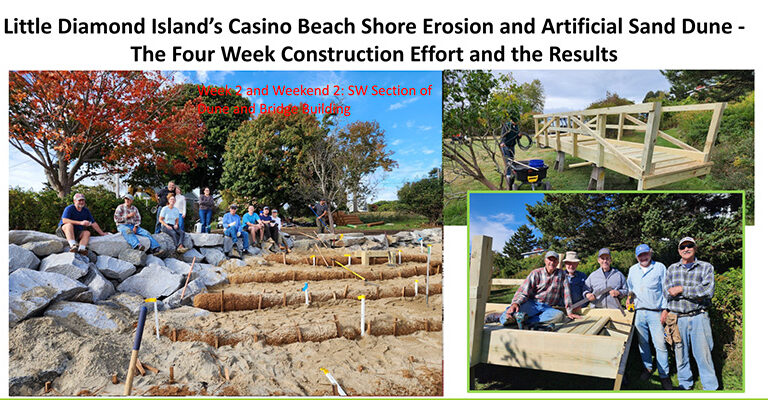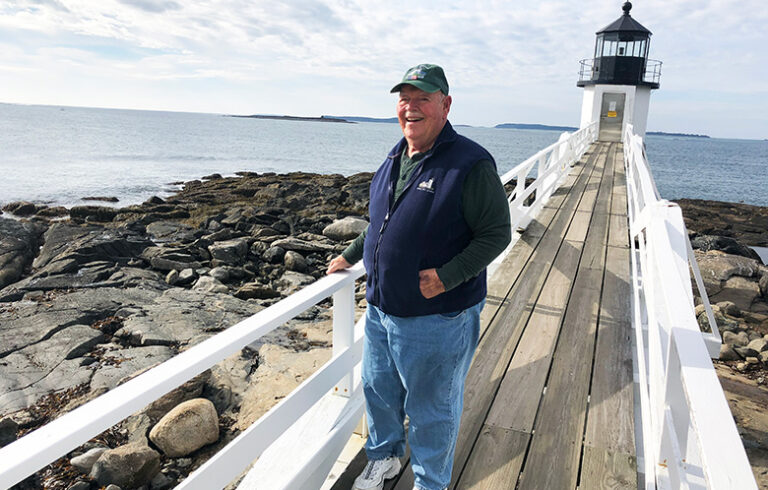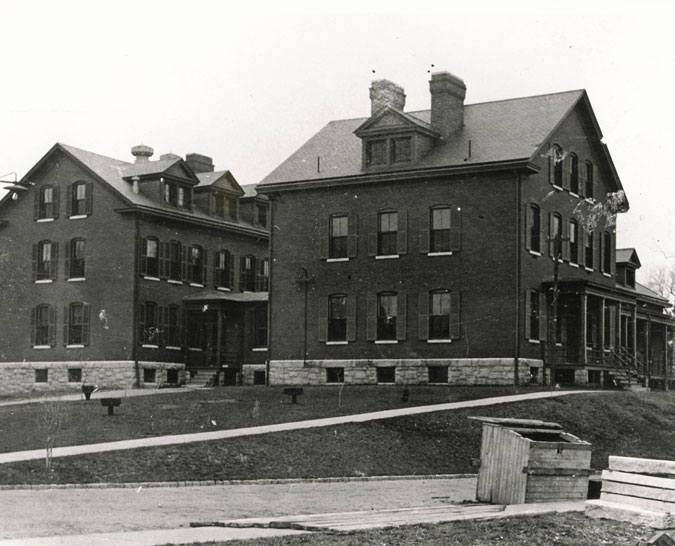
Last March, the city of Portland put out a request for proposal to sell what was once Fort McKinley’s hospital on Great Diamond Island in Casco Bay. The city received one bid for the tax-acquired building. By October, a purchase and sale agreement with the bidder was awaiting the expected approval from the city council when the proverbial wrench jammed up the works.
The city’s attorney was attending a training during which new changes to the state law mandating how municipalities handle the sale of tax-acquired property was discussed. Among the new amendments are changes to how municipalities sell their tax-acquired properties.
Municipalities are now required to hire a real estate agent to list tax-acquired properties instead of soliciting bids through a request for proposal. The new change, effective Aug. 9, 2024, meant that Portland had to restart its effort to sell the hospital.
Built in 1903, the two-and-a-half story, brick hospital has been empty for nearly 80 years. According to the Fort McKinley Museum website, the fort’s construction began in 1890 as part of a federal effort to strengthen coastal defenses.
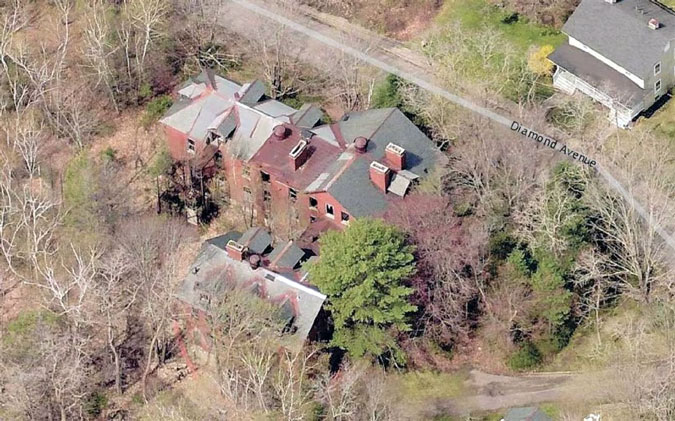
Fort McKinley was active from the late 1800s through the Second World War. The fort had a staff of around 800, ballooning to 1,400 during World War II. The U.S. Army left the fort in 1947 and the U.S. Navy took over the property in 1954. The property was sold by the navy to private owners in 1961.
In a state of neglect, the fort, which was added to the National Register of Historic Places in 1985, was sold to Portland-based developer David Bateman in the mid-1980s. Bateman spent 30 years redeveloping the property.
Today, the property is a mix of restored historic fort buildings and new construction, with single-family residences, condos, an inn, and a restaurant that are part of the nonprofit Diamond Cove Homeowners Association. While the city of Portland owns the hospital building and the land directly under it, the land beyond the foundation is owned by the association.
Bateman had an option on the hospital to redevelop it, too, which he ultimately didn’t take. When the option period passed, the city was left with the responsibility of a deteriorating building.
“At the end of the day, we just want that building to be redeveloped,” said Greg Watson, Portland’s director of housing and economic development. “We’ve done just some very bare things to make it safe and to keep people out of it, but it is rapidly deteriorating, and we would like to see it brought back to what it was. It’s really a beautiful building.”
When it was built in 1903, Fort McKinley’s hospital’s slate roof was pristine. Its large windows were flanked by shutters. Wood wraparound decks on the first and second floors were made for stretching the legs or sitting to catch an ocean breeze. No tree or shrub obscured views of Casco Bay.
After nearly 80 years of abandonment, the Colonial Revival-style building is posted with no trespassing signs, its remaining wood structures collapsing or collapsed, its windows either missing glass or boarded up. Overgrown trees and shrubs nearly envelop it.
While it’s frustrating that the city had to restart the process of selling the building, Watson is hopeful that a deal will happen. The city is working with real estate agent Sara Reynolds, who listed the hospital for sale in December for $250,000. The listing has resulted in some questions about the property, Watson said, but no offers were made as of the end of December.
The bidder from last spring, Jon Miller of Hemlock House Development of North Yarmouth, has a right of first refusal to any offer that comes in. Portland’s city council approved the right of first refusal agreement in October in lieu of approving the purchase and sale agreement that was made moot due to the changes in state law.
Miller says he’s still interested and plans on making an offer for the property. “The original purchase and sale that we intended to complete will just be the same,” he said at the beginning of January. The Portland Press Herald reported in August that Miller’s bid was $201,500.
“The intent is still to do condos that align with the existing association out there,” he said. In his bid to the city last spring, he proposed nine market-rate condos ranging from 1,500 to 2,600 square feet. If he is able to purchase the hospital, he’d like to begin construction in the spring of 2026, he said, but he is well aware of the significant challenges the project faces.
Among them are financial capacity, obtaining historic tax credits, the costs and complications of construction on an island, adhering to historic property rules, and working closely with the Diamond Cove Homeowners Association.
“Whoever tries to develop it is going to have to really negotiate with the association long and hard, to be honest, because everybody’s very concerned about this,” said MaryEllen FitzGerald, the association’s liaison to the city for the hospital redevelopment project, who lives seasonally in one of the renovated historic buildings of the fort and in Cape Elizabeth the rest of the year.
While FitzGerald believes most homeowners in the association would support a residential or hospitality-oriented project, such as an inn, everyone is worried that a developer will start the project but not be able to complete it, leaving it in worse shape than it currently is in, she said.
There’s also the huge issue of the septic system. The hospital does not have one, FitzGerald said, and it won’t be able to connect to the association’s overboard discharge system because it is at capacity, so the developer will need to get an easement from the association to put a septic system on association-owned land.
“That will have to be negotiated—and not just negotiated; it has to be approved by 67% of the homeowners,” she said.
If the property can’t be appropriately developed by a highly-qualified developer who has the ability to work with the association, the homeowners would rather nothing be done to the property, said FitzGerald.
For now, everyone is waiting to see if any offers come in. According to the amended state law, the city has to keep the listing active for a year if a sale doesn’t take place.
